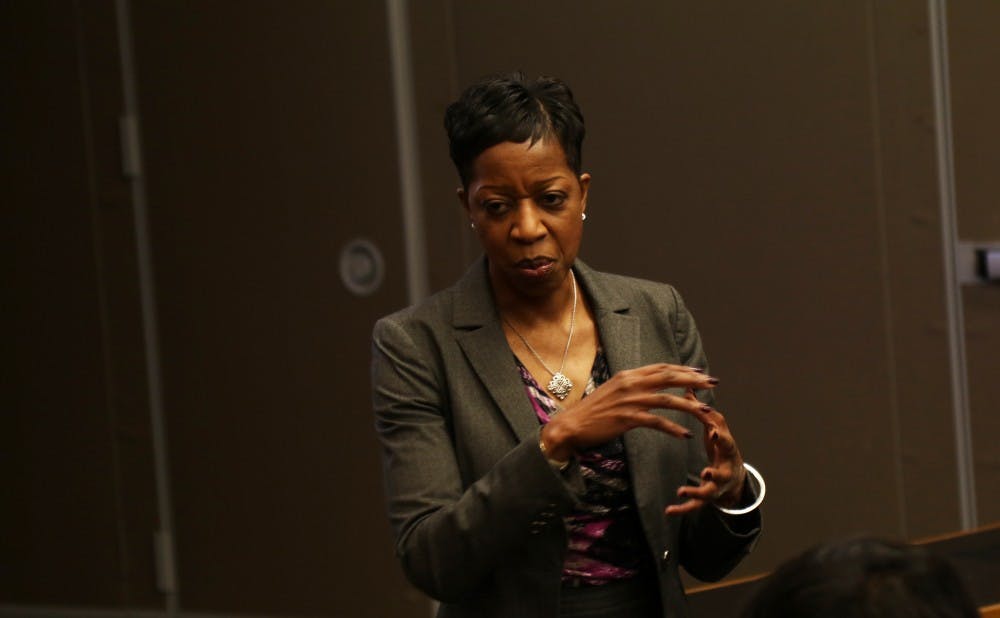The Duke Student Government Senate sealed the death of the Krzyzewskiville walk up line for the North Carolina game at its Wednesday meeting.
The Senate confirmed several changes to K-Ville policy for this year’s tenting season. These rule tweaks include the addition of flex tenting to replace the walk up line for the University of North Carolina at Chapel Hill basketball game. There will be a set of additional white tents that will not be guaranteed entry to the game.
Other changes include instituting additional disability accommodations, banning tables to prevent drinking games, altering the formal definition of a line check to include both being in K-Ville and checking in with a line monitor. Weekday night hours were also shifted from 2:30 a.m. to 7 a.m. to the new times of 1 a.m. to 7 a.m.
Sophomore Jia Jia Shen, senator for equity and outreach, gave a speech against the policy, arguing that the end of night hours should be earlier to keep the length of night hours consistent. Shen was the only vote against the policy.
The change comes after the Line Monitors announced earlier this month that they intended to kill the walk up line, which drew attention last year after it devolved into a drunken mob on game day.
Previously, the walk up line was part of the tenting system that allowed pairs to camp out for a couple of days in order to try to gain admission, rather than taking part in a large group tent. But it has come under fire from students because of issues with students cutting in the line, which came to a head this past year.
Because the Line Monitors are part of DSG, the Senate had the final call on making the changes to the group's rules.
Dean Valerie Ashby fields senators' questions
Valerie Ashby, dean of Trinity College of Arts and Sciences, also paid a visit to DSG's meeting.
A large part of the discussion centered on Trinity’s strategic plan. Ashby described the the College’s effort to balance its three main priorities—delivering excellence across Trinity, developing leadership and mentoring and fostering diversity. She noted that the wide variety of departments within the school can make this balancing act difficult.
“When we talk about priorities, you need to think about what could be a priority for classics, philosophy, computer science, dance, art history and physics,” she said. “That’s Trinity.”
Although the Duke brand carries a connotation of excellence, Ashby said that standard is not always met within the school itself.
“Was [Calculus] 101 great?” Ashby asked the Senate. “Some of you might have loved it just like it was. You’re in the 1 percent…When I say that we’re serious about deliberate excellence, that can’t happen.”
She also emphasized the importance of faculty leaders—specifically in mentoring new faculty members—and of economic diversity among the student body.
Ashby also referenced Duke’s recent decision to stop covering health insurance for some students who receive financial aid, admitting that it can be difficult to balance need-blind admissions with the school’s financial priorities.
“Duke struggles in this financial diversity space for students,” Ashby said. “We want to be need-blind. On paper we’re need-blind. The other universities with whom we are competing for you, who are also need-blind, have endowments that are about five to six times larger than ours.”
Harvard University’s endowment, the largest in the country at $39.2 billion dollars, is around four and a half times the size of Duke’s. Other universities also have endowments that dwarf Duke’s—those at Yale and Stanford are valued at $29.4 billion and $26.5 billion, respectively.
Ashby also described how she encourages diversity in the hiring process by approving the members of search committees and the lists of candidates they pick for jobs. She addressed low retention rates among women and minorities in Pratt School of Engineering, the lack of government funding to pay for ROTC cadets’ room and board and the possibility of creating an American Sign Language program at Duke.
In other business
The Senate confirmed sophomore Anjali Kunapaneni, first-year Achilles Dabrowski and sophomore Will Brodner as associate justices in the DSG Judiciary. The justices were sworn in after their confirmation. The Senate also confirmed first-years Maria Morrison as director of LGBTQIA+ affairs and policy and Kami Pullakhandam as director of communication.
Junior Avery Boltwood, president pro-tempore, informed the Senate that Hyde House has filed a lawsuit against the Senate within the DSG Judiciary. The lawsuit comes after the Senate recently declined to recognize the “selective social group.”
Junior Pranav Ganapathy, DSG technology and innovation adviser, delivered a special presentation on resources offered by the Duke Innovation and Entrepreneurship Department and the Innovation Co-Lab. These include office hours, consultation and Innovation Co-Lab grants.
The Senate approved $12,000 in Student Organization Finance Committee funding for Alpha Kappa Delta Phi’s WongFu Productions Duke Tour. The Senate also recognized the charters of Duke Gymnastics and Duke Inside Education Club.
Get The Chronicle straight to your inbox
Signup for our weekly newsletter. Cancel at any time.
Matthew Griffin was editor-in-chief of The Chronicle's 116th volume.

